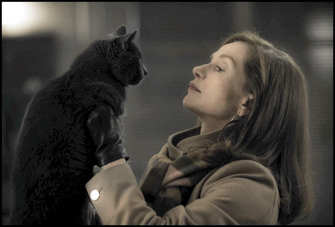
Paul Verhoeven’s Elle is a scary film, not so much because of the sickening violence and twisted sexuality – hey, we’re used to that – or because of its use of horror-film tropes – “Don’t do that,” you scream silently as Michèle (Isabelle Huppert), the “heroine,” blithely puts herself in risky situations over and over – but because of said heroine’s total lack of emotional reaction to events that would leave any normal person a blubbering mess.
This condition, I just learned from Wikipedia, is called “flat affect,” and can be caused by post-traumatic stress disorder. Michèle has certainly suffered trauma, but we don’t find out about that until much later in the film.
The gray cat the camera focuses on at the beginning of Elle could be a proxy for Michèle. We hear screams and grunts and groans, but all we see is the cat, watching with mild interest whatever is going on and then walking away indifferently. We see only the aftermath of the rape (at this point, anyway; later in the film it is shown directly several times in flashbacks). Does Michèle call the police? No, she calmly cleans up the mess of broken dishes and takes a bath.
The next day she goes to work as usual, and we discover that she runs a successful company that makes the kind of violent video games that some say encourage real-life violence. We also discover that she’s a nasty person and that all her employees hate her, except her second in command, Anna (Anne Consigny), who is also her best friend.
Why did I keep thinking that only a man could be behind this film? Because the portrait of the main character just didn’t ring true. Not only is Elle directed by Verhoeven – known for many other films full of extreme violence and sexual weirdness, among them Robocop, Total Recall and Basic Instinct – but it is also based on a novel (Oh…) by another man, Philippe Djian. Men are certainly capable of creating authentic women characters, but this isn’t one of them.
Isabelle Huppert is excellent, as always. She is, of course, a veteran at playing this type of twisted character with a cool facade – think The Piano Teacher.
I couldn’t wait for the long (two hours and 10 minutes) film to end, and when I left the cinema, I was revolted. It has stayed with me, however, a sign of its power (the day after I see a new movie by Woody Allen, for example, I can’t remember the first thing about it). What really bothered me about Elle was the flippant way it treats traumatizing experiences like rape, infidelity, murder and general cruelty as if they were no big deal, jokes to be laughed off.
If you go to see this film, don’t be surprised if you leave with a bad taste in your mouth and look at everyone who crosses your path with deep suspicion. That’s the unhappy effect it had on me. But at least it did have an effect – reassurance that, thankfully, I am not a victim of flat affect.
Favorite